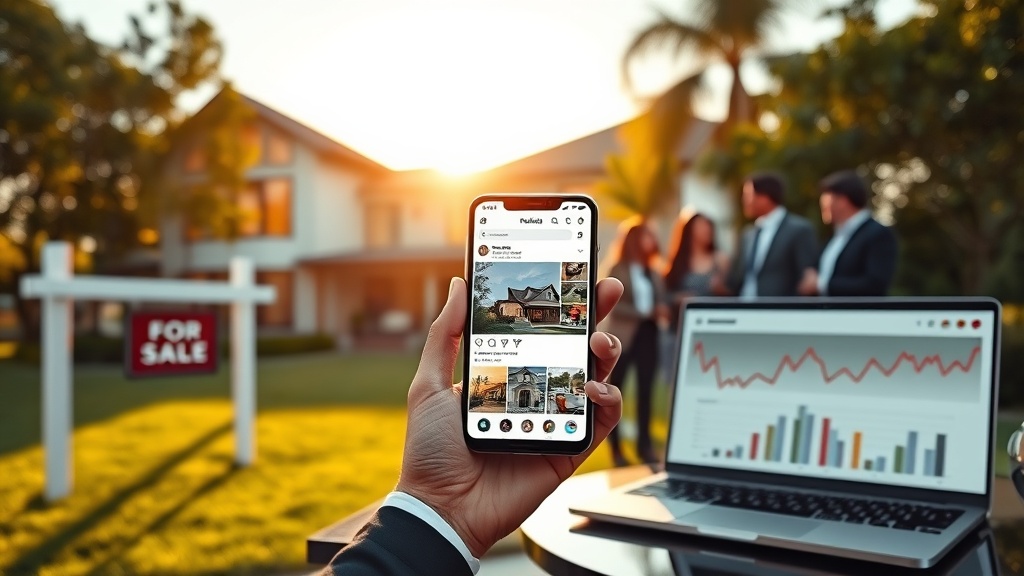The Top 5 Social Media Platforms for Real Estate Agents—And How to Actually Win on Each One

" "
If you’re hustling in real estate, you’ve probably heard the same tired advice: “Just get on social media and start posting!” And maybe you did. Maybe you set up the Instagram, the Facebook page, maybe even a TikTok. But if you’re honest, the results feel… underwhelming. Your listings are getting lost in a sea of posts, your engagement is flatter than a vacant lot, and you’re wondering if those viral real estate Reels are just for agents who moonlight as comedians.
Here’s the thing: Social media should be the most powerful tool in your marketing toolbox—but only if you know which platforms to focus on, and how to use each one like a pro (not like your cousin who posts cat memes on Facebook). The truth? Every platform has its own secret handshake, its own rules of engagement, and its own audience.
Let’s break down the top five platforms for real estate agents in 2024—and, more importantly, how to actually make them work for you, not the other way around.
1. Instagram: Where Homes Become Aspirational Stories
If you think Instagram is just for influencers and latte art, you’re missing the gold mine. This is where people go to dream—and that’s exactly what real estate is about. Your future clients aren’t just looking for a house; they’re imagining a new chapter.
Why Instagram?
It’s a visual-first platform. People scroll for inspiration, not information. A beautifully staged living room, a before-and-after renovation, a sun-drenched backyard—these aren’t just pics. They’re invitations to imagine a better life.
How to Win:
- Showcase Stories, Not Just Listings:
Don’t just post static photos with square footage and a price tag. Instead, weave a mini-story. “Imagine morning coffee here.” “This patio? Summer gatherings await.”
The agents who get traction are selling lifestyles, not just addresses.
Leverage Reels and Stories:
Instagram is pushing short-form video hard. Walk through a property, narrate quick tips for buyers, or share a behind-the-scenes look at prepping a home for sale.
These little glimpses build trust and personality—two things Zillow can never offer.Engage Deeply, Not Just Widely:
Reply to comments. DM people who engage with your posts. Create polls in Stories (“Which kitchen would you choose?”). Think of every interaction as the start of a conversation, not a transaction.Hashtags and Geotags Matter:
Use hyperlocal hashtags (#DallasHomes, #QueenAnneSeattle) and always geotag locations. This puts your posts in front of buyers already eyeing those neighborhoods.
Mini-story:
There’s an agent in my network who started doing “Sunday Strolls”—Reels where she walks her dog through a neighborhood, pointing out the quirks and the best coffee shops. Her DMs? Exploded with locals and transplants wanting the inside scoop.
2. Facebook: The Home Base for Community and Trust
Some whisper that Facebook is “over.” But for real estate, it’s far from dead—it’s just matured. Here, you’re not just selling homes; you’re building a reputation as a local authority.
Why Facebook?
It’s where people go to connect with their communities, ask for recommendations, and—yes—stalk open house photos in their neighborhood.
How to Win:
- Create a Business Page That Feels Human:
Your page should look inviting, not corporate. Feature your face, not just your logo. Share wins, testimonials, and the occasional candid moment. (Did your dog photobomb your latest open house? Post it.)
Join (or Start) Local Groups:
Community groups are where referrals are born. Answer questions in “Moms of Henderson” or “Seattle Homeowners Unite” without pitching. People remember the agents who help without a sales pitch.Go Live—But Have a Point:
Don’t just wander around with your phone. Plan a purpose: virtual open houses, Q&A sessions about financing, myth-busting local market trends.
The more value you offer, the more Facebook’s algorithm will reward you.Run Targeted Ads (if You’re Ready):
Facebook’s ad platform is still the most granular for targeting buyers and sellers by location, age, interests, and life events (think: “recently married” or “new job in town”).
Mini-story:
A real estate friend of mine once posted a heartfelt video after a closing, thanking the family and sharing a quick anecdote about their home search. It was raw, honest, and real. That post? Tripled her referrals in the following month. People crave authenticity far more than perfection.
3. LinkedIn: The Overlooked Powerhouse for High-Value Leads
If Facebook is the neighborhood barbecue, LinkedIn is the business lunch. It’s not where you’ll get viral memes, but it is where you’ll find serious clients—especially those relocating for work or investing.
Why LinkedIn?
The network effect is strong. Professionals looking to relocate, executives investing in properties, HR teams seeking relocation specialists—this is your crowd.
How to Win:
- Polish, Don’t Over-Personalize:
Your profile should read like a trusted advisor, not a hard-selling agent. Focus on results (“Helped 18 families relocate with zero stress in 2023”) and expertise (“Navigating Bay Area off-market deals”).
Post Industry Insights, Not Just Listings:
LinkedIn loves thought leadership. Post about trends in mortgage rates, local market data, or what homebuyers need to know about a new law.
Authority here earns attention.Use LinkedIn Articles:
Longer-form posts can position you as an expert. Write a piece on “What Tech Workers Moving to Austin Need to Know” or “5 Things Corporate Buyers Overlook.” These get shared—and remembered.Network Like a Human:
Comment on others’ posts. Congratulate new job moves (and offer to help with relocation). Don’t drop a sales pitch in every message—build relationships first.
Mini-story:
A top agent I know landed her biggest deal after congratulating a contact on a promotion and offering market insights for executives moving to the city. No pitch—just value. Two weeks later, she was representing his company’s incoming hires.
4. YouTube: Your 24/7 Digital Open House
YouTube isn’t just for viral dance challenges and makeup tutorials—it’s the second largest search engine in the world. And when people are serious about moving, they binge research neighborhoods, home tours, and market explainers.
Why YouTube?
Video is the closest you get to a face-to-face meeting without ever leaving your office. People feel like they know you before they’ve even emailed.
How to Win:
- Create Binge-Worthy Playlists:
Don’t just post one-off house tours. Build playlists: “Moving to Portland—What You Need to Know,” “First-Time Buyer Mistakes,” “Best Neighborhoods for Families.”
The more you guide the journey, the more YouTube’s algorithm will reward you.
SEO Isn’t Optional:
Use clear, search-friendly titles (“3-Bedroom Home Tour in Uptown Dallas”), add detailed descriptions, and sprinkle in keywords. YouTube’s search is literal—help it help you.Be Yourself on Camera:
You don’t need a studio. People want to see you, not a robot. If your dog barks or you flub a line, roll with it. Authenticity builds trust.Answer Real Questions:
Check the comments on your videos and others in your market. What are people asking? Make videos that answer those questions.
Example:
There’s a small-town agent whose “Day in the Life of a Small-Town Realtor” series regularly gets thousands of views—not because it’s slick, but because it’s honest. People want a sense of the real local life, not just square footage stats.
5. TikTok: The Fast Track to Hyper-Local Fame
Hear me out. Yes, TikTok is a land of dance trends and Gen Z humor. But it’s also where niche experts are blowing up—especially those who know how to turn five seconds into a “wow, I need to DM this person.”
Why TikTok?
The algorithm is ruthless, in a good way. If you make content that hooks viewers—even just a handful—TikTok will push it far beyond your current followers.
How to Win:
- Short, Snappy, and Specific:
Nobody wants a full listing readout. Try: “3 things buyers forget at open houses,” “The secret behind that ‘pending’ sign,” or “What $500k gets you in [city].”
Keep it under 30 seconds if you can.
Ride the Trends (But Stay On-Brand):
Use trending sounds, effects, and hashtags, but always tie it back to real estate. Think: lip-syncing to a trending audio about “falling in love” while showing a dream kitchen.Hyper-Local Content Wins:
“Best coffee shops near [neighborhood],” “Hidden parks in [city],” or “Local market update in 15 seconds.” People want local expertise, not generic advice.Engage Relentlessly:
Reply to every comment, duet with potential buyers, stitch local business owners. The more active you are, the more TikTok will reward you.
Example:
One agent’s “POV: You just bought your first home in [city]” series turned into a lead magnet—not because it was perfectly scripted, but because it was funny, real, and hyper-local. People want to see themselves in your stories.
The Platform Isn’t the Point—Connection Is
Here’s the dirty secret: No platform alone will make you a star agent. The magic happens when you match your message to the medium—and then show up, consistently and authentically.
Some of the most successful agents I know aren’t the most polished, the most technical, or the most “influencer-y.” They’re just relentless about making real connections, sharing real value, and letting their personality shine through. One started with cell-phone videos of messy morning commutes to listings and built a following that now fills her open houses before she even hangs the sign.
So, what’s your next move?
Pick one platform—yes, just one at first. Learn its rhythms. Experiment. Make mistakes in public. As you find your groove, branch out. But always remember: Social media isn’t about shouting the loudest, it’s about being the most helpful, human, and memorable voice in the room.
Key reminders as you dive in:
- Focus on community over vanity metrics.
- Think like a local guide, not a billboard.
- Let your quirks breathe. People hire people, not brands.
- Give more than you ask. The referrals will follow.
You don’t need to be everywhere. You just need to be the agent people remember—on the right platform, at the right time, with the right message. That’s how you turn social media from a time suck into your most valuable lead source.











